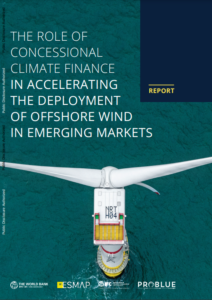Full Title: The Role of Concessional Climate Finance in Accelerating the Deployment of Offshore Wind in Emerging Markets
Author(s): Oliver Knight, Sean Whittaker, Mark Leybourne, and Fern Gray
Publisher(s): Energy Sector Management Assistance Program
Publication Date: September 6, 2023
Full Text: Download Resource
Description (excerpt):
Offshore wind will be critical to achieve the world’s decarbonization and sustainable development goals. Although the cost of offshore wind has dropped dramatically over the past decade, there will be an initial cost premium when developing offshore wind in emerging markets due to a variety of risks and constraints in establishing a new market. Concessional climate finance could help countries overcome this initial cost barrier to help reduce costs for future projects and lay the foundation for the development of successful offshore wind markets.
This report from World Bank’s Energy Sector Management Assistance Program (ESMAP) and International Finance Corporation (IFC), finds that concessional climate financing is essential to unlock offshore wind in emerging markets and estimates that US$15 billion in concessional climate financing, consisting of both grants and loans, could catalyze offshore wind deployment across ten emerging market countries.
According to the report, concessional climate financing consisting of US$ 4.8 billion of concessional public debt, US$ 8.3 billion of concessional private debt, and US$ 2.5 billion in grants over an initial five-year period would enable the development of ten pathfinder projects between 500-1,000 MWs each, driving down the average Levelized Cost of Electricity (LCOE) from US$100 per megawatt-hour (MWh) to US$70 per MWh.
This concessional financing could therefore be a key solution to unlocking offshore wind potential and benefits in emerging markets, while representing a big-ticket solution to accelerate the pace of global decarbonization for donor countries.
